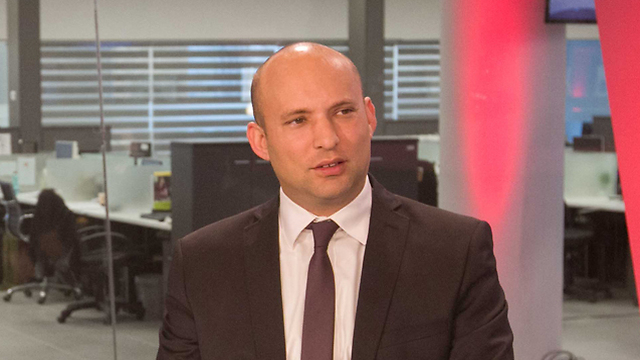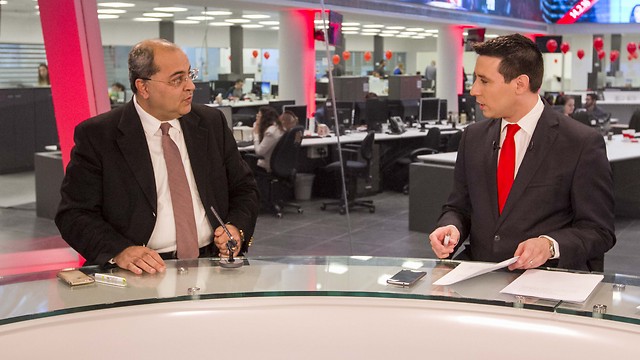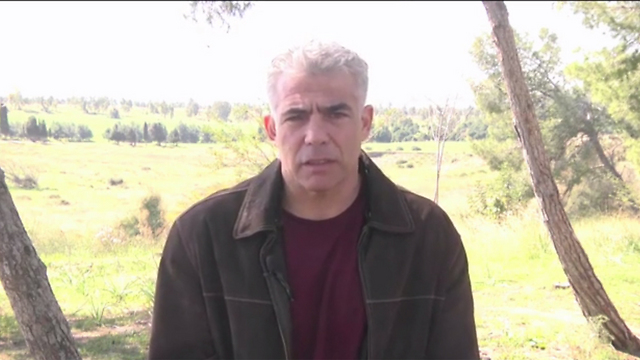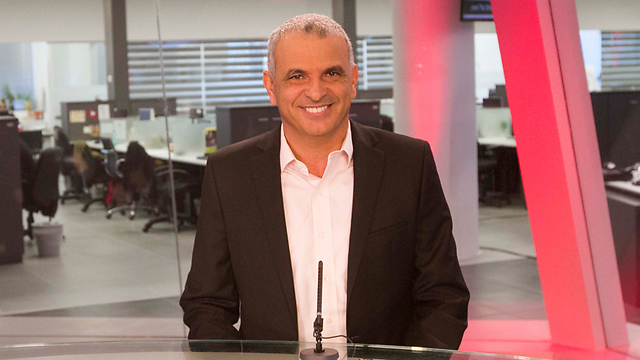Slew of politicians visit Ynet’s new studio for its debut broadcast; Tibi: ‘Holding onto bodies amounts to necrophilia’; Lieberman: ‘Gov’t has no clear policies’; Lapid: ‘Israeli foreign policy completely fallen apart.’
Education Minister Naftali Bennett called on Sunday to annex Area C of the West Bank, while giving the Palestinians “autonomy on steroids” in Areas A and B.
“We’ve already separated from the Palestinians, they’re governing themselves,” the Bayit Yehudi leader said at the new Ynet studio’s debut broadcast. “My plan is to actually give the Palestinians a sort of autonomy on steroids in Areas A and B, while in Area C, we gradually start applying our sovereignty. Let’s start with Gush Etzion. We need to start advancing this.”

“I think the government has done a lot,” Bennett said about the ongoing wave of violence. “I remind you there was a very intensive wave of terror attacks in Jerusalem and with the help of the government, this wave has definitely abated, and moved from Jerusalem to the Hebron-Gush Etzion area, where were are currently in the midst of an ongoing wave of terrorism. Look, we’ve been dealing with terrorism in Israel for 120 years, long before the state was founded, long before the Six-Day War. We’ve overcome this before.”
List MK Ahmad Tibi also discussed the Israeli-Palestinian conflict, declaring that “We, the Joint List, do not represent the Zionist narrative; we are not a part of that game. You need to get used to the fact that we are 20 percent of the country and another people, but we want co-citizenship for Jews and Arabs.”
Tibi, who did not participate in a recent meeting of Arab MKs with families of terrorists, said it was “legitimate and humanitarian. In Islam, one must bury the deceased immediately. What the Israeli government is doing amounts to necrophilia.”

Tibi also discussed the rightward turn of the Labor Party and its head, Isaac Herzog: “Our opinion regarding the two state solution is solid. The policies of Benjamin Netanyahu’s government are closing the door on it and Herzog is supposed to provide an alternative, but he is not doing that. Thus, we are criticizing him and we will continue to do so on this issue and socioeconomic issues.”
Herzog, on his part, attempted to draw clear differences between his and Netanyahu’s policies vis-à-vis the Palestinians: “The difference between me and Bibi is clear. I want to separate from the Palestinians and Netanyahu is not ready to do anything that will change the status quo. I am taking steps to change the status quo.”

Minister of Culture and Sport Miri Regev spoke about her efforts to halt funding to some cultural institutions. “The Culture Ministry is not an ATM. It is not acceptable that I can transfer funds to a cultural organization, but I cannot cut off those funds after a given organization undertakes anti-Israel activity,” she said.
“There is no connection between freedom of speech and freedom of funding. Freedom of speech is a part of the DNA of the Israeli society. Everyone can say and write what they want, but the moment we need to fund someone, that is something else.”
Yisrael Beytenu leader Avigdor Lieberman, who served as the foreign minister in Prime Minister Netanyahu’s previous government but was left in the opposition this term, argued that the current government does not have clear policies. “The problem with this government is that there is a lack of policy. One day the IDF Chief of Staff tells us that the existential threat facing Israel is Hezbollah and he sees opportunities in the agreement with Iran. The day after, the defense minister says that Iran is the greatest threat.”
Yesh Atid leader Yair Lapid, who was the finance minister in Netanyahu’s previous government and like Lieberman found himself in the opposition this term, also voiced strong critiques of the current government. “Israeli foreign policy has completely fallen apart. The Foreign Ministry has been divided between six ministers and public diplomacy has been divided between six ministries. People here do not understand the extent of the foreign policy crisis and implications of it for our national security,” he said.

Interviewed from the Gaza border, Lapid also talked about the situation on the southern border a year and a half after Operation Protective Edge. “We need to a stick and carrot policy. On the one hand, we need to partake in the major process of building a Gaza port, which would guarantee seven to eight years of quiet for the Israelis living in this area. On the other hand, we need to destroy tunnels the minute they are uncovered and not wait for the next Operation Protective Edge

Finance Minister Moshe Kahlon expressed his reservations about a biannual budget. The Kulanu leader said, “There are major challenges in the bi-annual budget and I oppose it for that reason.” However, he said that he and the prime ,inister are trying to reach a compromise: “I am committed to a coalition agreement and we are trying to find a way to resolve this issue.”
As reported by Ynetnews
